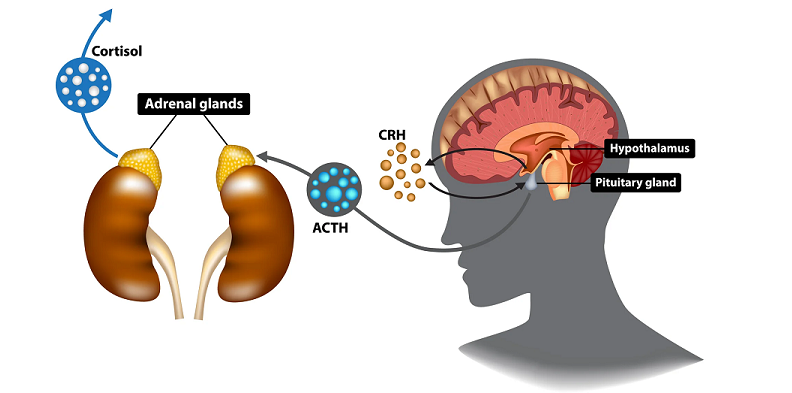
In the fast-paced world we inhabit, stress is an inevitable companion, often triggering a cascade of hormonal responses within our bodies. Among these, adrenaline stands out as a key player. But how does this well-known ‘fight or flight’ hormone affect our cognitive abilities during stressful situations? Adrenaline, a hormone and a neurotransmitter, is synonymous with the body’s stress response. Its surge can be a double-edged sword: on one hand, providing the necessary alertness and quick thinking needed in critical situations, and on the other, potentially affecting our brain’s functioning in prolonged stressful scenarios.
Contents
Understanding Adrenaline
Before digging into how adrenaline impacts cognitive function during stress, it’s essential to understand what adrenaline is and its role in the body’s physiological processes. Adrenaline, often known in the scientific community as epinephrine, plays a pivotal role in our body’s response to stress and danger.
Chemical Composition and Production of Adrenaline
Adrenaline is a hormone and a neurotransmitter produced primarily in the adrenal glands, which sit atop our kidneys. Chemically, it belongs to a group of compounds known as catecholamines, which are derived from the amino acid tyrosine. Adrenaline is synthesized through a series of enzymatic reactions, starting from tyrosine and eventually leading to the production of this potent hormone. This synthesis is a marvel of biological engineering, showcasing the body’s ability to respond rapidly to external stimuli.
Role of Adrenaline in the Body’s Stress Response
The primary function of adrenaline is to prepare the body for a ‘fight or flight’ response in stressful situations. When we encounter a threat, our brain signals the adrenal glands to release adrenaline into the bloodstream. This release triggers a series of physiological changes: an increase in heart rate, expansion of air passages in the lungs, dilation of blood vessels in the muscles, and a spike in blood sugar levels. These changes prime the body for immediate physical action, providing the energy and oxygen needed to either confront the danger or flee from it.
Adrenaline’s Mechanism of Action in the Brain
Adrenaline’s influence extends beyond these physical responses. Its impact on the brain is particularly significant in understanding its role in cognitive function. When adrenaline binds to receptors in the brain, it influences various cognitive processes [1].
It can heighten alertness, sharpen focus, and improve the brain’s ability to form short-term memories under stress. However, the effects of adrenaline on the brain are not uniformly positive. Under chronic stress conditions, prolonged exposure to high levels of adrenaline can lead to cognitive impairments, such as difficulty in concentrating and making decisions.

Cognitive Function and Stress Explained
To fully grasp the impact of adrenaline on our mental processes during stress, it’s crucial to first understand what we mean by cognitive function. Cognitive functions encompass a wide range of mental abilities that are essential for carrying out daily tasks, from the simplest to the most complex.
What Constitutes Cognitive Function?
Cognitive function refers to a variety of mental processes including memory, attention, perception, decision-making, problem-solving, and language comprehension. These functions are not isolated; they work in tandem to help us interpret and interact with the world around us. For instance, memory plays a role not just in recalling past events, but also in helping us make decisions based on past experiences.
Key Cognitive Processes Affected by Stress
Stress, especially when it triggers a release of adrenaline, can have a profound effect on these cognitive functions. While a moderate level of stress can enhance some aspects of cognition, such as alertness and short-term memory, excessive stress can impair cognitive abilities. For example, chronic stress can lead to difficulties in concentration, decision-making, and may even impact long-term memory retention [2].
The Role of Hormones in Cognitive Performance
The connection between hormones like adrenaline and cognitive function is intricate. Hormones can act as neuromodulators, altering the activity of neurons in the brain and thus influencing cognitive processes. Adrenaline, in particular, can enhance certain aspects of cognition in the short term but may be detrimental in the long term if stress is chronic. Understanding this dynamic is key to appreciating both the potential benefits and risks associated with the body’s stress response.
Adrenaline’s Effect on Cognitive Processes During Stress
Having established what adrenaline is and how it functions, along with an understanding of cognitive processes, we now explore the specific effects of adrenaline on cognitive function during stress. This hormone, while primarily known for its role in the ‘fight or flight’ response, also significantly influences various cognitive functions.
Adrenaline’s Short-term Impact on Cognitive Functions
In the short term, during acute stress situations, adrenaline can have a profound impact on several key cognitive functions.
Alertness and Concentration
Adrenaline release during stress heightens alertness, making an individual more aware of their surroundings. This increased alertness aids in focusing attention on the task at hand, which can be crucial in high-pressure or dangerous situations.
Decision-Making Abilities
In moderate amounts, adrenaline can also sharpen decision-making abilities. The enhanced alertness and focus can allow for quicker and more decisive action, which is essential in situations where rapid response is necessary [3].
Memory Recall
There is evidence to suggest that adrenaline can improve short-term memory recall. This is particularly true for memory associated with the emotional content of a situation, which can be crucial for learning and survival.
Adrenaline’s Long-term Impact on Brain Health
While the short-term effects of adrenaline can be beneficial, its long-term impact on cognitive function, especially under chronic stress, is a different story.
Neuroplasticity and Brain Adaptation
Chronic exposure to high levels of adrenaline can affect the brain’s neuroplasticity – its ability to adapt and change over time. Prolonged stress can lead to changes in brain structure and function, particularly in areas involved in memory and emotion.
Potential Risks of Chronic Stress and High Adrenaline Levels
Long-term stress and consequent sustained high levels of adrenaline can have detrimental effects on cognitive health. These include impaired memory, reduced cognitive flexibility, and difficulties in learning. Chronic stress is also linked to mental health issues such as anxiety and depression, which further impact cognitive functions.

Practical Implications of Adrenaline’s Role in Stress
The insights gained from understanding adrenaline’s impact on cognitive functions during stress are not just theoretical; they have practical implications for everyday life. Managing stress and understanding how to harness the positive aspects of adrenaline can significantly improve cognitive function and overall well-being.
Strategies to Manage Stress and Adrenaline Levels
Mindfulness and Relaxation Techniques: Practices such as meditation, deep breathing, and yoga can help in reducing stress levels, thereby decreasing the production of adrenaline. These techniques promote relaxation and can enhance cognitive functions impaired by stress.
Physical Activity
Regular exercise is a powerful stress reliever. It not only uses up the excess adrenaline released during stress but also promotes the release of endorphins, chemicals in the brain that are natural painkillers and mood elevators.
Balanced Diet
Consuming a well-balanced diet, particularly foods rich in omega-3 fatty acids, antioxidants, and B vitamins, can support brain health and improve resilience to stress [4].
Adequate Sleep
Quality sleep is crucial for cognitive functions and managing stress. It helps in the consolidation of memory and allows the body to recover and regulate hormone levels, including adrenaline.
Tips for Enhancing Cognitive Function in Stressful Situations
Prioritizing and Organizing Tasks: Breaking down tasks into smaller, manageable parts can help in reducing the feeling of being overwhelmed, which in turn can lower stress levels.
Developing Coping Strategies
Identifying personal stress triggers and developing strategies to cope with them can help in managing stress more effectively. This might include time management techniques or seeking social support [5].
Learning Relaxation Techniques for Immediate Use
Techniques like deep breathing or visualization can be used in the moment to manage acute stress, helping to maintain cognitive function during high-pressure situations.
Importance of Balanced Hormone Levels for Cognitive Health
Balancing hormone levels, particularly adrenaline, is crucial for maintaining optimal cognitive function. Chronic imbalances in hormones due to prolonged stress can lead to cognitive impairments. Regular check-ups with a healthcare provider can help in identifying and addressing any hormonal imbalances.
References
[1] Epinephrine (Adrenaline): What It Is, Function, Deficiency
[2] Understanding the stress response
[3] Stress and cognitive function
[4] Chronic stress puts your health at risk
[5] Adrenal Stress Hormones and Enhanced Memory for Emotionally Arousing Experiences

